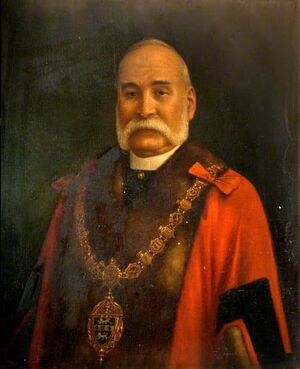Alderman (nonfiction): Difference between revisions
No edit summary |
No edit summary |
||
| Line 6: | Line 6: | ||
Similar titles exist in Germany and in Scandinavian countries, such as the German ''Ältester'', the Swedish ''Ålderman'' and the Danish ''Olderman'', which all mean "elder man" or "wise man". | Similar titles exist in Germany and in Scandinavian countries, such as the German ''Ältester'', the Swedish ''Ålderman'' and the Danish ''Olderman'', which all mean "elder man" or "wise man". | ||
== In the News == | |||
<gallery mode="traditional"> | |||
File:The_Dirty_Alderman_(1847).jpg|"The Dirty Alderman" (''Punch'', 1847) still gets a laugh during the [[Aldermania|Aldermania Days Festival]]. | |||
</gallery> | |||
== Fiction cross-reference == | == Fiction cross-reference == | ||
| Line 12: | Line 18: | ||
== Nonfiction cross-reference == | == Nonfiction cross-reference == | ||
External links: | External links: | ||
Revision as of 10:51, 22 June 2016
An alderman is a member of a municipal assembly or council in many jurisdictions founded upon English law.
The term may be titular, denoting a high-ranking member of a borough or county council, a council member chosen by the elected members themselves rather than by popular vote, or a council member elected by voters.
The title is derived from the Old English title of ealdorman, literally meaning "elder man", and was used by the chief nobles presiding over shires.
Similar titles exist in Germany and in Scandinavian countries, such as the German Ältester, the Swedish Ålderman and the Danish Olderman, which all mean "elder man" or "wise man".
In the News
"The Dirty Alderman" (Punch, 1847) still gets a laugh during the Aldermania Days Festival.
Fiction cross-reference
- Aldermania - a psychological condition characterized by the perceived, but typically delusional, need to be an Alderman.
Nonfiction cross-reference
External links:
- Alderman @ Wikipedia

